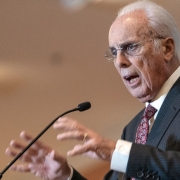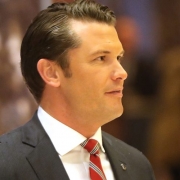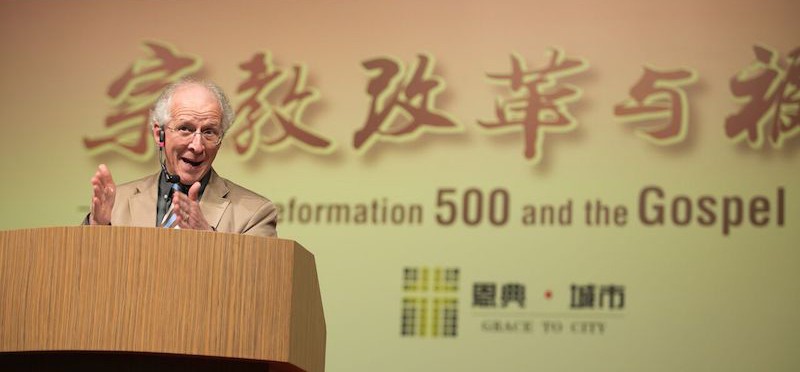Pope Francis vs. John Piper: Two views of ‘masculinizing’ the church
This article originally appeared at Baptist News Global on December 27, 2023.
“One of the great sins we have had is ‘masculinizing’ the church,” Pope Francis admitted to the International Theological Commission last month in what could potentially become the most impactful theological repentance of the year.
“Women have a capacity for theological reflection that is different from what we men have,” the pope acknowledged. “The church is woman. And if we do not understand who women are, what the theology of a woman is, we will never understand what the church is.”
Francis revealed plans to have “a reflection on the feminine dimension of the church” during the next gathering of the Council of Cardinals. His goal is for theologians to focus their theological study and efforts on “de-masculinizing” the church.

Rick Pidcock
The pope’s apology is a stark contrast to John Piper’s claim that “God has given Christianity a masculine feel.”
“For the sake of the glory of women, and for the sake of the security and joy of children, God has made Christianity to have a masculine feel. He has ordained for the church a masculine ministry,” declared Piper, a conservative Calvinist pastor who is highly influential among Reformed evangelicals.
With both these statements taken together, it’s clear sacralized misogyny in the church extends far beyond the narrow strain of conservative evangelical complementarian Calvinism we so often critique. It has marked the ecclesial structures of the church across entire traditions.
Piper and the pope agree the church has been masculinized. But one seems to think it’s a bug, while the other definitely considers it a feature. If we are going to move into the new year with the intention of de-masculinizing the church, we need to reflect on how deeply rooted sacralized masculine power is in the church.
Leadership trends in society and the church
In order to assess how masculinized the church is, it helps to know how leadership trends in the church compare to leadership trends in broader society. For example, one of the pope’s concerns is that just five of the 28 members of the International Theological Commission are women, despite 54% of the Catholic Church identifying as female.
According to research by the IT job search company Leftronic, the United States is comprised of 50.8% women, with women earning 57% of undergraduate degrees and 59% of master’s degrees.
But despite women being the majority gender while having the majority of degrees, women hold just 31% of CEO positions, 29% of senior management roles, 24% of political offices and 12.5% of CFO jobs.
In the church, the trend for women in leadership has drastically changed for the better over the last half century. Sociologist Wilbur Bock discovered in 1960 that women comprised 2.3% of clergy in the United States. According to the American Communities Survey census data in 2016, women made up 20.7% of U.S. clergy.
Of course, this 20.7% would be in moderate to more progressive denominations. Most theologically conservative denominations and churches have 0% female clergy, and even vocally supportive groups like the Cooperative Baptist Fellowship lag behind their aspirational goals for churches hiring female clergy.
“Capitalism has done more for the affirmation and advancement of women’s leadership than conservative Christianity has.”
But taken as a whole, women in corporate leadership trail the population of women by at least 20%, while the church lags behind by at least 30%. This means capitalism has done more for the affirmation and advancement of women’s leadership than conservative Christianity has.
Masculine echo chambers of authority and theology
When men who think they have a divine right to be in charge because they’re men are the only ones in the top room of a hierarchical tower, it’s going to affect everything from the theology to the ethics.
Not only are conservative Christian churches run exclusively by men, but parachurch organizations as well. Every member of the boards of trustees for the Association of Certified Biblical Counselors, The Gospel Coalition and the Council on Biblical Manhood and Womanhood is a man.
When no women are allowed to have an authoritative voice, their perspectives will not be heard and valued to the same degree as men’s voices. And when these ministries are designed to help people “live out the gospel,” the exclusive presence and authority of men will affect how theology and ethics are developed.
To these men, male headship is an entire theological lens for interpreting reality, establishing authority and defining the gospel.
Hearing the masculinized gospel in a woman’s critique of abusive men
If it’s true that conservative evangelical theology is inherently misogynistic and abusive, then we should expect to see reflections of conservative evangelical theology in the behaviors of abusive men.

Lacy Johnson
Lacy Johnson, an author and professor at Rice University, shared her experience of being abused by a man in a 2018 piece for Tin House.
“He was the one who taught me that it actually didn’t matter how likable I was, there was always the threat of violence or punishment for saying or doing something he didn’t like. … I tried diminishing myself in such a way that I wouldn’t provoke him, wouldn’t anger him, tried to bend myself according to his pleasure so that he would like everything I did and said and thought,” she said. “It didn’t matter, because no matter what I did, it was never enough. I kept at it anyway, until there was almost nothing left of me, of the person I had been. And that person I became, who was barely a person of her own, is the version of me he liked best.”
“When I first read this passage, I was stunned at how her description of an abusive man fit the description of the masculinized god of conservative Christianity.”
Johnson was not writing about theology. She was sharing her experience with abusive men from the perspective of a woman. But when I first read this passage, I was stunned at how her description of an abusive man fit the description of the masculinized god of conservative Christianity.










Leave a Reply
Want to join the discussion?Feel free to contribute!